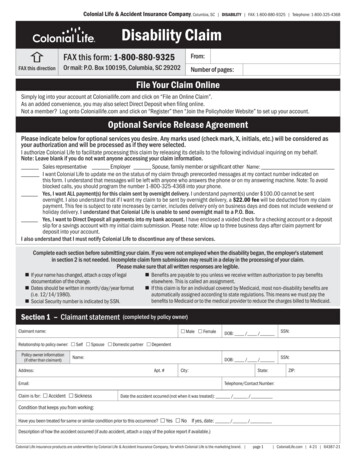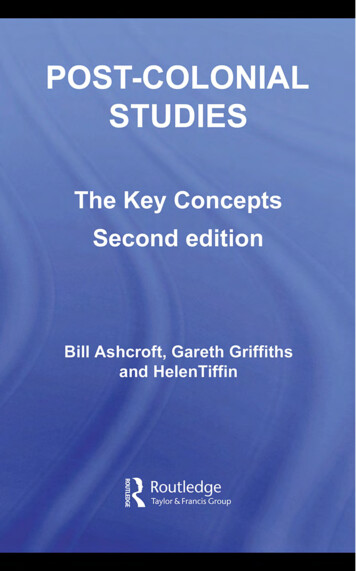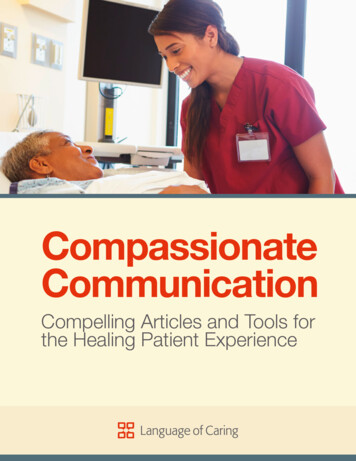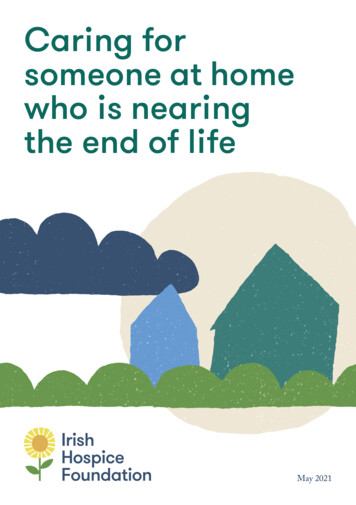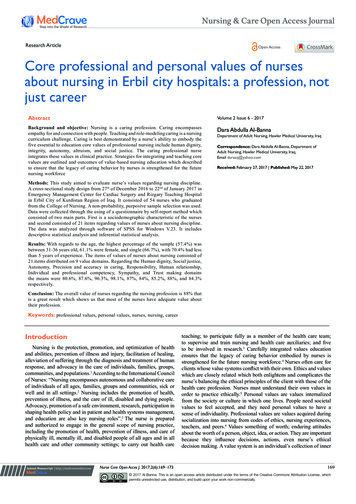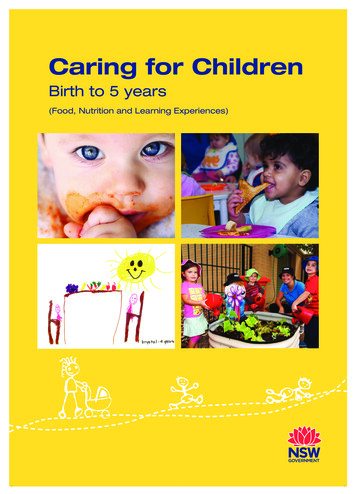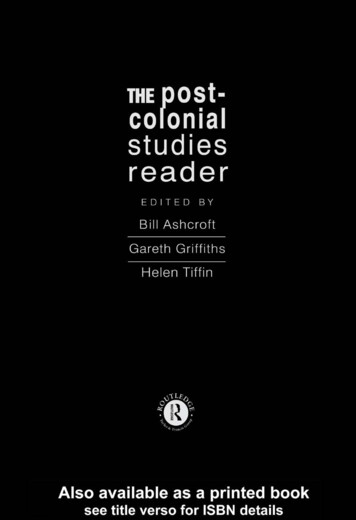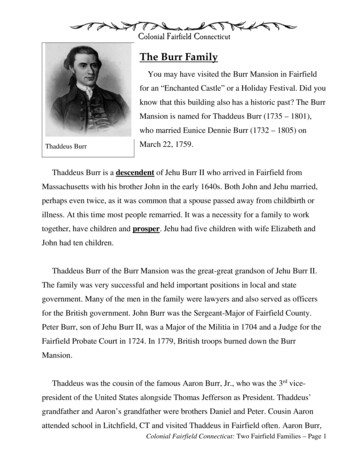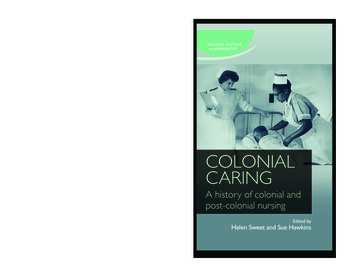
Transcription
A history of colonial and post-colonial nursing’A treasure trove of fresh insight, new research and analysis, this bookdemonstrates the vibrancy of nursing history. Its editors should be congratulatedfor their vision and energy in bringing together a series of chapters which expressnot only the many meanings of colonialism, but reveal how nursing provides akaleidoscope through which to view broader social attitudes towards race, class,gender and the value of care from a comparative perspective.’Anne Marie Rafferty, Professor of Nursing and Dean of theFlorence Nightingale School of Nursing and Midwifery, King’s College LondonThe history of nursing presents a unique perspective from which to interrogatecolonialism and post-colonialism. Nurses were often a key conduit betweencoloniser and colonised, and many powers used nurses as a means ofinsinuating their own cultures into the lives of indigenous people. However,despite the valuable insights such an approach reveals, colonial history hasnever before been approached from this particular direction.Colonial caring will be an essential read for colonial historians, as well ashistorians of gender, ethnicity and nursing.Helen Sweet is a Research Associate at the Wellcome Unit for the History of Medicine,University of OxfordSue Hawkins is a Senior Lecturer in History at Kingston University LondonCover image:Lutheran Mission Hospital sisterand student nurse, South Africawww.manchesteruniversitypress.co.ukISBN 978-0-7190-9970-0Sweet and Hawkins (eds)Colonial caring brings together essays from an international group of historianswho examine the relationship between colonialism, nursing and nurses. Gender,class and race permeate the book, as the complex relationships between nurses,their medical colleagues, governments and the populations they nursed areexamined in detail, using case studies which draw on exciting new sources.Many of the chapters are based on first-hand accounts of nurses, producing aview of the colonial process from the ground, or use multiple sources to piecetogether a story which was never recorded in its entirety in official records.The book offers insight into the colonial process as conducted by British,Dutch, American and Italian governments; and how nursing not only affectedcolonial societies but was itself changed by its experiences.Colonial caringColonial caringColonialcaringA history of colonial andpost-colonial nursingEdited by9 780719 099700Helen Sweet and Sue Hawkins
Colonial caring
Th s series provides an outlet for the publication of rigorousacademic texts in the two closely related disciplines of NursingHistory and Nursing Humanities, drawing upon both theintellectual rigour of the humanities and the practice-based,real-world emphasis of clinical and professional nursing.At the intersection of Medical History, Women’s History andSocial History, Nursing History remains a thriving and dynamicarea of study with its own claims to disciplinary distinction. Thebroader discipline of Medical Humanities is of rapidly growingsignifi ance within academia globally, and this series aims toencourage strong scholarship in the burgeoning area of NursingHumanities more generally.Such developments are timely, as the nursing professionexpands and generates a stronger disciplinary axis. The MUPNursing History and Humanities series provides a forum withinwhich practitioners and humanists may offer new fi dings andinsights. The international scope of the series is broad, embracing all historical periods and including both detailed empiricalstudies and wider perspectives on the cultures of nursing.Previous titles in this series:Mental health nursing: The working lives of paid carers in thenineteenth and twentieth centuriesEdited by Anne Borsay and Pamela DaleOne hundred years of wartime nursing practices, 1854–1954Edited by Jane Brooks and Christine E. Hallett‘Curing queers’: Mental nurses and their patients, 1935–74Tommy DickinsonHistories of nursing practiceEdited by Gerard M. Fealy, Christine E. Hallett andSusanne Malchau DietzWho cared for the carers? A history of the occupational healthof nurses, 1880–1948Debbie Palmer
COLONIAL CARINGA history of colonial andpost-colonial nursingEDITED BY HELEN SWEET AND SUE HAWKINSManchester University Press
Copyright Manchester University Press 2015While copyright in the volume as a whole is vested in Manchester UniversityPress, copyright in individual chapters belongs to their respective authors, and nochapter may be reproduced wholly or in part without the express permission inwriting of both author and publisher.Published by Manchester University PressAltrincham Street, Manchester M1 7JAwww.manchesteruniversitypress.co.ukBritish Library Cataloguing-in-Publication DataA catalogue record for this book is available from the British LibraryISBN 978 0 7190 99700 hardbackISBN 978 1 5261 29369 open accessFirst published 2015This electronic version has been made freely available under a CreativeCommons (CC-BY-NC-ND) licence. A copy of the licence can be viewed 0/The publisher has no responsibility for the persistence or accuracy of URLs forany external or third-party internet websites referred to in this book, and doesnot guarantee that any content on such websites is, or will remain, accurateor appropriate.
Contentspage viiviiixiiiList of figu esContributorsAcknowledgementsIntroduction: contextualising colonial andpost-colonial nursingHelen Sweet and Sue Hawkins1 Lady amateurs and gentleman professionals:emergency nursing in the Indian MutinySam Goodman2 Imperial sisters in Hong Kong: disease, confli t andnursing in the British Empire, 1880–1914Angharad Fletcher3 The social exploits and behaviour of nurses during theAnglo-Boer War, 1899–1902Charlotte Dale4 ‘They do what you wish; they like you; you the goodnurse!’: colonialism and Native Health nursing inNew Zealand, 1900–40Linda Bryder5 Training the ‘natives’ as nurses in Australia: so whatwent wrong?Odette Bestv118416084104
Contents6 Working towards health, Christianity anddemocracy: American colonial and missionary nursesin Puerto Rico, 1900–30Winifred C. Connerton7 The early years of nursing in the Dutch East Indies,1895–1920Liesbeth Hesselink8 A sample of Italian Fascist colonialism: nursingand medical records in the Imperial War inEthiopia (1935–36)Anna La Torre, Giancarlo Celeri Bellotti and Cecilia Sironi9 Changes in nursing and mission in post-colonial NigeriaBarbra Mann Wall10 Two China ‘gadabouts’: guerrilla nursing with theFriends Ambulance Unit, 1946–48Susan Armstrong-ReidAfterwordRima D. Apple126145169188208232Select bibliographyIndex237243vi
Figures3.1 ‘Two in a tub’, Estcourt, 1900 (courtesy ArmyMedical Services Museum, Aldershot)page 695.1 Half-caste dormitory (Booth private photo collection)1125.2 Full-bloods’ camp (Booth private photo collection)1137.1 Mrs Bervoets and her husband with student nursesand student midwives in Mojowarno around 1910(courtesy National Museum of World Cultures,Amsterdam, collection no. 10002346)1497.2 Midwife and student midwives at Semarang around1910 (courtesy National Museum of World Cultures,Amsterdam, collection no. 10000788)1618.1 Princess Maria Jose of Italy on a ‘white boat’, 1935(Giancarlo Celeri Bellotti’s personal collection)17510.1 Elizabeth and Margaret (kindly provided byMs Rebecca Tesdell, from Margaret Stanley’spersonal papers)20910.2 Map of MT19 trek213vii
ContributorsRima D. Apple studied at New York University and the Universityof Wisconsin-Madison and has held joint appointments in theSchool of Human Ecology Departments of Consumer Science andInterdisciplinary Studies, Women’s Studies Program, Science andTechnology Studies Program and Department of Medical History andBioethics. Professor Apple received a Vilas Life Cycle Professorship,University of Wisconsin Vilas Associateship, Burroughs WellcomeGrant and the School of Human Ecology Alumni Faculty ProfessionalExcellence Award, and was named the ACOG-Ortho Fellow in theHistory of American Obstetrics and Gynecology. Her research focuseson the role of public health nurses in the evolution of maternal andchild care, the history of consumerism and the history of home economics as a profession for women.Susan Armstrong-Reid is an Adjunct Professor of History at theUniversity of Guelph in Ontario, Canada. Her teaching at the university, focusing on the changing global humanitarian landscape since1945, complements her research interest in global nursing withininternational organisations and in confli t zones. A member of theExecutive Committee of the Canadian Association for the History ofNursing, she also serves as an adviser on the Centre of LeadershipStudies at the University of Guelph.Giancarlo Celeri Bellotti gained his Nursing diploma in Milan, in1982. In 1990 he graduated in Nursing Management and in 2009gained his MscN. After experience in a cardio-emergency ward andin operating theatres, in 1999 he became a tutor in Nursing Scienceviii
Contributorsat the University of Milan. Since 2003, he has been President of theItalian Society for the History of Nursing. He is author of several articles on nursing history and in 2013 his book on Nursing History waspublished by Piccin, Padua.Odette Best through bloodline is a Gorreng Gorreng (Wakgunclan) and a Boonthamurra woman and through adoption she is aKoomumberri woman, commonly known as Aboriginal Australian.Odette is a registered nurse and her PhD was on ‘Yatdjuligin: the stories of Aboriginal Registered Nurses in Queensland from 1950–2005’.Currently she is undertaking research into the Native Nurses’ TrainingSchools in Queensland in the 1940s–50s and into identifying the fi stAboriginal registered nurse in Australia. She is a Senior Lecturer inthe Oodgeroo Unit at Queensland University of Technology.Linda Bryder is Professor of History at the University of Auckland, whereshe teaches and publishes in the history of health and medicine, focusingprimarily on Britain and New Zealand. Her DPhil at the University ofOxford on the history of tuberculosis was published as Below the MagicMountain: A Social History of Tuberculosis in Twentieth-century Britain(1988). Her other monographs include A Voice for Mothers: The PlunketSociety and Infant Welfare in New Zealand, 2007–2000 (AucklandUniversity Press, 2003), Women’s Bodies and Medical Science: An Inquiryinto Cervical Cancer (Palgrave Macmillan, 2010) and The Rise and Fall ofNational Women’s Hospital, A History (Auckland University Press, 2014).In 2013 she jointly edited with Janet Greenlees, Western Maternity andMedicine, 1880–1990 (Pickering and Chatto). She was recently PrincipalInvestigator on a two-year nursing oral history project funded by NewZealand’s Nursing Education and Research Foundation. She is a Fellowof the Royal Society of New Zealand.Winifred C. Connerton is an Assistant Professor at the Pace UniversityCollege of Health Professions, in New York City. Her current projectis a book exploring the connections between early twentieth-centuryUS imperialism and nursing in the American-held territories of Cuba,Puerto Rico, Hawaii and the Philippines. She holds a PhD in NursingHistory from the University of Pennsylvania, and Midwifery degreesfrom the Universities of California in San Francisco and San Diego.ix
ContributorsDr Connerton practises midwifery in East Harlem, NYC, where sheworks with underserved immigrant populations. Her interest in nursing history is informed by her clinical practice working with familiesand colleagues from all over the world.Charlotte Dale recently completed her PhD in Nursing History atthe University of Manchester entitled: ‘An enquiry into nursing careprovision during the period of the Anglo-Boer war 1899–1902’. Shegraduated as a Registered Nurse (Adult) in 2006 from the Universityof Hull and worked as an orthopaedic nurse before leaving to pursueacademic study in 2009. Charlotte received the Mona Grey Prize fromthe University of Manchester for her thesis research proposal and theMonica Baly Bursary from the Royal College of Nursing to pursuethis work, alongside fi ancial support from the Wellcome Trust.Angharad Fletcher is currently completing a PhD jointly with theUniversity of Hong Kong and King’s College London. She holds a BAand MA from University College London, and her present researchfocuses on British imperial nursing during the third plague pandemicand Second Boer War in Cape Town, Hong Kong and Sydney. Shewas awarded the inaugural Wang Gungwu Prize for her MPhil, whichreassessed the experiences of Australian nurses interned during theSecond World War. Her work has also appeared in Medical History.Sam Goodman is a lecturer in Linguistics (English and Comm unication) at Bournemouth University. He is currently researchingthe intersection between medicine and Anglo-Indian fi tion of thepost-war period, and is the author of British Spy Fiction and the End ofEmpire (Routledge, 2015). He is also the editor of Medicine, Health andthe Arts: Approaches to the Medical Humanities (Routledge, 2013) withVictoria Bates (Bristol) and Alan Bleakley (Plymouth).Sue Hawkins gained her doctorate in History from KingstonUniversity in 2007, on nursing in Victorian London. In addition toteaching nineteenth-century British social history and various levelsof skills courses at undergraduate and MA level, she is project manager of the Centre for the Historical Record’s (CHR) digitisation projects. These have included projects on nineteenth-century children’sx
Contributorshospitals and, in collaboration with King’s College London Archives,a project on the registers of the Royal British Nurses Association,which she will be using for a new research project on mobility andcareer development in nineteenth-century nursing. The most recentCHR project is in conjunction with the British Red Cross and involvesthe digitisation of 250,000 personnel cards relating the Voluntary AidDetachments during the First World War. In 2013 Sue was PrincipalInvestigator (in collaboration with the Royal Society, the University ofLiverpool and the Rothschild Archive) for an AHRC project, Womenin Science Research Network, which has created a network of historians, scientists and social scientists interested in the history of women’sinvolvement in science. Her book, Nursing and Women’s Labour inthe Nineteenth Century: The Quest for Independence, was published in2010 by Routledge and came out in paperback in 2012.Liesbeth Hesselink After graduating in History, Liesbeth Hesselinkworked as a teacher in secondary schools and then as a civil servant,fi st for the Dutch Ministry of Education and later for the municipality of Leiden. She also represented the Dutch Labour Party as amember of the board of Councillors for the municipality of Leidenfor eight years. After retirement, she attained her doctorate in 2009with her thesis entitled Genezers op de koloniale markt, inheemsedokters en vroedvrouwen in Nederlands Oost-Indië 1850–1915(Amsterdam: Amsterdam University Press, 2009), translated intoEnglish as Healers on the Colonial Market: Native Doctors andMidwives in the Dutch East Indies (Leiden: KITLV Press, 2011).Anna La Torre is a Teaching Assistant at the University of Milan,focusing on Nursing History. Currently she studies at the Faculty ofHistory, where her specialisation is in the history of Christianity. Shehas an MsN and is an RN. Since 2011 she has been a member of theItalian Society for the History of Nursing and Italian National Nurses’Association (CNAI), representing Italian nurses on the InternationalCouncil of Nurses, Nursing History Chapter.Cecilia Sironi gained her Nursing diploma in 1980 and completed acourse for nurse teachers and managers (University of Milan, 1986) andworks in nursing education. She published L’infirmiere in Italia: storiaxi
Contributorsdi una professione on Nursing History in 1991 and obtained her BNS(Dublin, 2001), Master’s in Nursing Research (King’s College London,2003) and Master’s in Nursing Sciences (University of Florence, 2006),with her main topic in Nursing History on religious congregations inthe nineteenth and twentieth centuries. She is President of the ItalianNational Nurses’ Association (CNAI), representing Italian nurses onthe International Council of Nurses.Helen Sweet trained as a nurse and midwife before making a careerchange into the fi ld of history. The monograph from her PhD thesis, Community Nursing and Primary Healthcare in Twentieth-CenturyBritain, was published in 2007 and was issued in paperback by Routledgein 2012. In 2009 Helen also co-edited From Western Medicine to GlobalMedicine with colleagues Professor M. Harrison and Dr M. Jones andin the same year also co-edited Women in the Professions, Politics andPhilanthropy with Dr K. Bradley. She has published widely on the history of nursing and medicine in South Africa and is currently preparing a second monograph, a study of mission hospitals and their roleswithin the rural communities of KwaZulu Natal. Helen is ResearchAssociate at the Wellcome Unit for the History of Medicine, OxfordUniversity. She was founder-convenor of the National Colloquium forNursing History Research from 1997 to 2013 and has been a member of the UKCHNM advisory body, Forum member of the RCN’sHistory of Nursing Society and is currently on the Advisory body ofthe UKAHN. In 2013 she was elected FRHistS.Barbra Mann Wall is Associate Professor of Nursing and AssociateDirector of the Barbara Bates Center for the Study of the History ofNursing at the University of Pennsylvania. Dr Wall received herBS and MS in Nursing in Texas and her PhD in History from theUniversity of Notre Dame. She has published several books, includingUnlikely Entrepreneurs: Catholic Sisters and the Hospital Marketplace,1865–1925 (Ohio State University Press, 2005) and American CatholicHospitals: A Century of Changing Markets and Missions (RutgersUniversity Press, 2011). Dr Wall is editor-in-chief of the internationaljournal, Health Emergency and Disaster Nursing.xii
newgenprepdfAcknowledgementsColonial Caring: A History of Colonial and Post-colonial Nursingemerged from a history of nursing colloquium hosted at the ModernHistory Faculty of the University of Oxford and co-organised bythe Oxford Wellcome Unit for the History of Medicine and the UKAssociation for the History of Nursing conference committee. Oursincere thanks go to both organisations as well as to those whoattended the colloquium, contributing ideas and enthusiasm for thisbook. We are especially grateful to Professor Mark Harrison, whogave this event his departmental and personal support, and to BelindaMichaelides, who oversaw so much of the administrative work.We would also like to acknowledge a number of people withoutwhom this book would not have been possible: fi st and foremost,our gratitude to the nurses about whom this is written, some of whomhave contributed through memoirs, letters, oral histories or photographic records. We would also like to thank Emma Brennan and theteam at Manchester University Press and our anonymous reviewers,for support, helpful advice and perceptive comments throughout thepublication process.Enormous thanks are also due to all the contributors, who havegiven their wholehearted backing to this project and made this bookwhat it is – we hope they all feel the hard work was worthwhile nowthe book is fin shed.Finally, numerous friends and relations at home and work havebeen extremely supportive – especially our husbands and immediatefamilies – and we should both like to thank them for their encouragement and moral support, especially as deadlines approached!xiii
Blank page
Introduction: contextualising colonialand post-colonial nursingHelen Sweet and Sue HawkinsNursing history has until recently been an insular analysis whose central theme was most often professionalisation within national borders,and although a more international perspective has been emergingover the past five to ten years there is still a big gap in its literaturewhen examining the role nurses and nursing played in a country’scolonial and post-colonial past and the impact that experience of thisparticular form of nursing had on the wider development of nursing.1Th s omission has already been addressed in the closely related fi ldof history of medicine through a number of publications over a longperiod of time,2 and this book aims to help correct the balance fornursing’s history.The history of nursing presents a unique perspective from whichto interrogate colonialism and post-colonialism, which includesaspects of race and cultural difference, as well as class and gender.Simultaneously, viewing nursing’s development under colonial andpost-colonial rule can reveal the different faces of what, on the surface, may appear to be a profession that is consistent and coherentyet in reality presents different facets and is constantly in the processof reinventing itself. Considering such areas as transnational relationships, class, gender, race and politics, this book aims to presentcurrent work in progress within this fi ld to better understand thecomplex entanglements in the development of nursing as it was imagined and practised in local imperial, colonial and post-colonial contexts. In addition, taking the more global view of nursing’s history notonly offers new insights into what is particular and what is more universal about nursing’s uptake and development in different countries,but also enables us to explore different methodological approaches1
Helen Sweet and Sue Hawkinsto the subject, as has already been the case with the fast-developingfi ld of ‘medical humanities’ for some time. Th s multifaceted viewof colonial and post-colonial nursing, therefore, brings together contributions from scholars working in different disciplines and from avariety of perspectives, geographical, historiographical and, to someextent, methodological, among others. Anne Marie Rafferty providesus with one example of this, noting: ‘[the archives of the CNA] exposethe complexity of the British nurses’ positions in the specific colonies,factors that motivated them to apply for overseas posts, the range oftheir attitudes to their colonial experiences, perceptions of their placein the imperial mission and the eventual decline in their status and theeffects on the nursing profession.’3 In the chapters that follow we hopeto go a step further by looking at some of these aspects of nurses andnursing viewed in a number of colonial and post-colonial settings.Whilst we have taken pains to select chapters that incorporatenursing provided by colonial powers across Western Europe and theUSA to make this as globally representative as possible, we are wellaware that in the ten chapters that follow we can only touch the surface of the story. By the end of the First World War, and despite theWestern nations’ ‘Scramble for Africa’4 the British Empire still covered about one quarter of the Earth’s total land area and ruled a population in excess of 500 million people. The composition of this bookrefl cts that reality.5Th s introductory chapter provides an overview of the book’s focus,structure and remit. It explains what the book sets out to accomplishand its overall structure. Here we highlight the commonalities as wellas the differences between the experiences of colonial nurses as theywill be presented in the coming chapters. Drawing from our ownexperience in researching and writing gender and racial social histories and in colonial and post-colonial nursing history respectively, ouraim here is to tease out the emerging themes and place these withina clear chronological and historiographical framework. Further, wewill examine how this fi ld has developed in the history of medicineand identify questions which the current state of research still leavesunanswered, but which nursing’s history is uniquely placed to answer.In particular we will be expanding upon the underlying racial and cultural tensions which existed, or perhaps did not exist, between nursesand their patients; nurses and the doctors they worked alongside; and2
Introductioncolonial nurses and their indigenous counterparts. Th s chapter askswhether the subject has not been hitherto grossly oversimplifi d byprojecting a single image of imperial collaboration/co-operation ontoall forms of colonial nursing by all countries across a long time span.In so doing, we not only hope to enhance the understanding of nursing’s history over a more global scale but also to provide historicalcontext to explain some of the problems that have faced the profession in the post-colonial era.Structure and contentThe book can be divided roughly into three sections, based on chronology: the mid-to late Victorian period, the early twentieth centuryand the mid-twentieth century. The fi st three chapters focus on thecolonial experiences of British nurses between 1857 and 1902; andperhaps inevitably, as Britain becomes entangled in confli ts related tochallenges to its Empire, two chapters examine the role and duties ofBritish nurses working in conjunction with the military. They explorenursing and nurses during the Indian Mutiny of 1853 and in southern Africa during the bloody Anglo-Boer war of 1899–1902. A thirdchapter in this group focuses on Hong Kong and the British responseto a threat of a different kind – the emergence and subsequent rampage of plague through China and beyond at the end of the century.The authors offer a number of observations, including women’s reasons for volunteering to work in such challenging environments, farfrom home, and the personal as well as professional challenges theyfaced. Recruitment and the professionalisation of nursing, and ofmilitary nursing in particular, are therefore considered here, particularly focusing on themes of class and gender.Moving into the twentieth century the next four chapters begin toexamine the embedding of Western-style nursing culture into indigenous cultures. These chapters widen our scope beyond the BritishEmpire to include not only Australia and New Zealand, but also theDutch East Indies and the American colonies of Puerto Rico and thePhilippines. Issues such as racism and clashes of culture now come tothe fore. The tensions between colonial nurses and their ‘Western’ culture of medicine and the traditional practices of indigenous trainees3
Helen Sweet and Sue Hawkinsand their patients are examined, as are issues of race and ethnicityassociated with segregation and ‘protection’. The discussions arethen taken further into the twentieth century for the fi al third ofthe book, refl cting upon Italian colonialism in Ethiopia, guerrillanursing in China by British and American nurses and Irish Catholicmissionary doctors and nurses working in colonial and post-colonialNigeria. In these chapters, religion and humanitarianism – as well asnursing in the face of stark inhumanity – become part of the equation,whilst relationships between colonised and colonisers is explored further, delving into the immediate post-colonial phases, again bringingrace, cultural differences and gender back into the discussion. Thesechapters also introduce pioneering methodologies relatively new tothe study of nursing history, including quantitative analysis of collective biographies.Colonialism applied to nursing’s historyIn Medicine and Colonial Identity, Mary Sutphen and Bridie Andrewsdescribed the challenge of trying to understand and study colonialism because the ‘crass lumping of colonial subjects by an imperialpower and the local subjectivity of individuals are two ends of thespectrum of perceived identity’.6 They identify the problem of writinghistory whilst doing ‘justice to more than a couple of strands of identity’,7 for example region and class, gender and religion, as categoriesof historical analysis. They found instead that the history of medicine allowed this juxtaposition whilst avoiding the pitfalls of grandhistorical narrative. Th s perhaps applies to an even greater extentto nursing history, where we encounter clashes of gender, class, raceand culture within a variety of geographical settings and yet wherethe broad brush of nurses’ and nursing’s identities may be more easily separated from those of the individual practitioners. Yet to whatextent did nurses embody and present the imperial identity, and howdid this vary according to time and place, group collective and individual nurses?We are interpreting colonialism throughout this book inits broadest sense. It is a concept that may be taken to cover theEuropean project of political domination that began in the sixteenth4
Introductioncentury and ran through to the twentieth century, culminatingwith the national liberation movements of the 1960s. As it can beconstrued as covering such a long period of time, colonialism hasbeen divided into several, somewhat arbitrary phases, and ColonialCaring will focus on the later phase, commonly recognised as ‘themodern European colonial project’ or ‘period of New Imperialism’.According to Margaret Kohn, this phase was born of and sustainedby the developments in transport and communications in the nineteenth century, through which ‘it became possible to move largenumbers of people across the ocean and to maintain political sovereignty in spite of geographical dispersion’.8 Post-colonialism will beused here to describe the period in which political and theoreticalstruggles of previously colonised societies broached their transitionfrom political, military and economic dependence to independentsovereignty.9Medicine’s and, by association, nursing’s role in this later colonialprocess may be seen as part of an attempt by the colonisers to justify the harsher sides of imperialism. These attempts at justifi ationwere taking place at the same time that political and religious thinkerswere trying to reconcile po
Florence Nightingale School of Nursing and Midwifery, King's College London The history of nursing presents a unique perspective from which to interrogate . is a book exploring the connections between early twentieth-century US imperialism and nursing in the American-held territories of Cuba, Puerto Rico, Hawaii and the Philippines. She .
